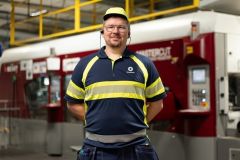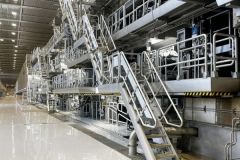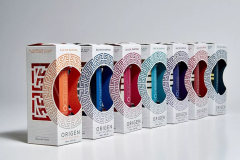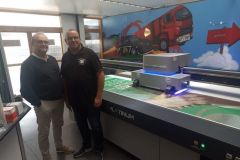The packaging industry is facing major challenges in reducing its carbon footprint while meeting consumer expectations in terms of sustainability. Stora Enso is part of this trend with the opening of its dry-molding production unit in Skene, Sweden. This new facility promises to be a milestone in the evolution of sustainable packaging solutions.
The dry molding process used in this unit enables the manufacture of products such as fiber-based cup lids, designed to replace traditional plastics. Unlike conventional wet molding, which consumes large quantities of water and energy, this technique significantly reduces these consumptions. This makes dry molding a more environmentally-friendly option.
In addition to reducing the resources required, this process also guarantees a low carbon footprint for the finished products. This is a major asset for companies seeking to improve their environmental footprint in an industry where regulatory pressure and consumer expectations are growing ever stronger.
The concept of circularity is at the heart of the Skene unit. Surplus materials generated during production are recovered and reused, thus limiting waste. This internal recycling principle optimizes the use of resources while minimizing environmental impact.
PulPac technology: fast and efficient
One of the technological pillars of this new unit is PulPac's dry-molded fiber technology. Recognized for its ability to produce renewable fiber solutions at high speeds, it enables Stora Enso to meet growing demand for more environmentally-friendly packaging.
With this technology, products can be customized in terms of barrier additives, offering functionalities tailored to the needs of different sectors, such as food and beverage. What's more, the process guarantees an excellent surface finish, paving the way for numerous advanced decoration possibilities.
Packaging markets are moving towards 100% renewable and biodegradable solutions, replacing single-use plastics. This pressure comes both from environmental regulations and from consumers, who are demanding more sustainable products.
With commissioning scheduled for the fourth quarter of 2024, this production unit will position Stora Enso as a key player in the supply of fiber packaging with a low ecological footprint.
According to Anna Stenström, the unit's Director of Operations, "Stora Enso is the first producer to implement this new technology on a large scale, which puts us at the forefront of the industry."
The success of this new unit is also based on the collaboration between Stora Enso and PulPac. This technological alliance is an example of how companies can combine industrial innovation with sustainability objectives. PulPac, a leader in the development of dry molding technology, provides technical expertise that enables production processes to be adapted to the demands of sustainability and speed.








